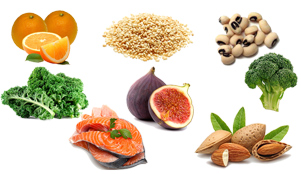by
Stepy —
January 7, 2019
- 8 dairy-free calcium sources for you.
- Calcium is one of the most common minerals in the human body, and is necessary for many functions. “Calcium is required for vascular contraction and vasodilation, muscle function, nerve transmission, intracellular signaling and hormonal secretion, though less than 1% of total body calcium is needed to support these critical metabolic functions,” states the National Institutes of Health.
- About 99 percent of the calcium in the body is found in bones and teeth, as it is essential for structure and function.
-
- Dairy products have been considered great sources of calcium, but those who are lactose intolerant cannot count on dairy to get their daily calcium.
- New research has shown that milk may not be as good for you as popularly believed.
- Fortunately, there are other sources to get daily calcium intake without consuming dairy.
- Let’s take a look at 8 healthy dairy-free calcium sources.
- Almonds:
- They are natural powerhouses, providing great benefits in the areas of brain and heart health.
- One cup of almonds provides 251mg of calcium, which is 25% of the recommended daily value.
- Black-eyed peas:
- These delicious little beans are an excellent source of calcium, providing 41.3mg of calcium per cup, which is 4% of the recommended daily value.
- They are also an excellent source of protein, iron, folate, and dietary fiber.
- Broccoli:
- It is part of the cruciferous vegetable family, which are potent multi-vitamin vegetables that have shown benefits in the area of cancer prevention and heart health.
- One cup of broccoli provides 42.8mg of calcium, which is 4% of the recommended daily value.
- Figs:
- These sweet, tasty fruits are packed with benefits, including heart health, breast cancer prevention, bone health, and blood pressure regulation.
- They provide 22.4mg of calcium per fruit, which is 2% of the recommended daily value.
- Kale:
- Like broccoli, kale is part of the cruciferous vegetable family, which means a myriad of health benefits.
- One cup of kale provides 90.5mg of calcium, which is 9% of the recommended daily value.
- Oranges:
- We all know that oranges are one of the best sources of vitamin C, but it is also an excellent source of calcium.
- One cup of oranges provides 72mg of calcium, which is 7% of the recommended daily value.
- Sesame seeds:
- One ounce of sesame seeds provides an impressive 277mg of calcium. This is 28 percent of the recommended daily value.
- Wild Alaskan salmon:
- This fatty fish is one of the best sources for omega-3 fatty acids, which are potent anti-inflammatory agents and antioxidants.
- One half a filet of salmon provides 26.7mg of calcium, which is 3 percent of the recommended daily value.
- Is milk good for you?
- Almonds are natural powerhouses.
-
- REFERENCES:
- 1. “10 Dairy Free Sources of Calcium – PositiveMed.” PositiveMed.com. Positive Med, n.d. Web. 10 Dec. 2013.
- 2. “Calcium.” Office of Dietary Supplements. National Institues for Health, n.d. Web. 10 Dec. 2013.
- 3. “Nutrition Facts and Analysis for Nuts, Almonds [Includes USDA Commodity Food A256, A264].” Nutritiondata.self.com. Self Nutrition Data, n.d. Web. 10 Dec. 2013.
- 4. “Nutrition Facts and Analysis for Broccoli, Raw.” Nutritiondata.self.com. Self Nutrition Data, n.d. Web. 09 Dec. 2013.
- 5. “Nutrition Facts and Analysis for Cowpeas, Common (blackeyes, Crowder, Southern), Mature Seeds, Cooked, Boiled, without Salt.” Nutritiondata.self.com. Self Nutrition Data, n.d. Web. 10 Dec. 2013.
- 6. “Nutrition Facts and Analysis for Figs, Raw.” Nutritiondata.self.com. Self Nutrition Data, n.d. Web. 10 Dec. 2013.
- 7. “Nutrition Facts and Analysis for Kale, Raw.” Nutritiondata.self.com. Self Nutrition Data, n.d. Web. 10 Dec. 2013.
- 8. “Nutrition Facts and Analysis for Oranges, Raw, All Commercial Varieties.” Nutritiondata.self.com. Self Nutrition Data, n.d. Web. 10 Dec. 2013.
- 9. “Nutrition Facts and Analysis for Fish, Salmon, Atlantic, Farmed, Cooked, Dry Heat.” Nutritiondata.self.com. Self Nutrition Data, n.d. Web. 10 Dec. 2013.
- 10. “Nutrition Facts and Analysis for Seeds, Sesame Seeds, Whole, Roasted and Toasted.” Nutritiondata.self.com. Self Nutrition Data, n.d. Web. 10 Dec. 2013.


















